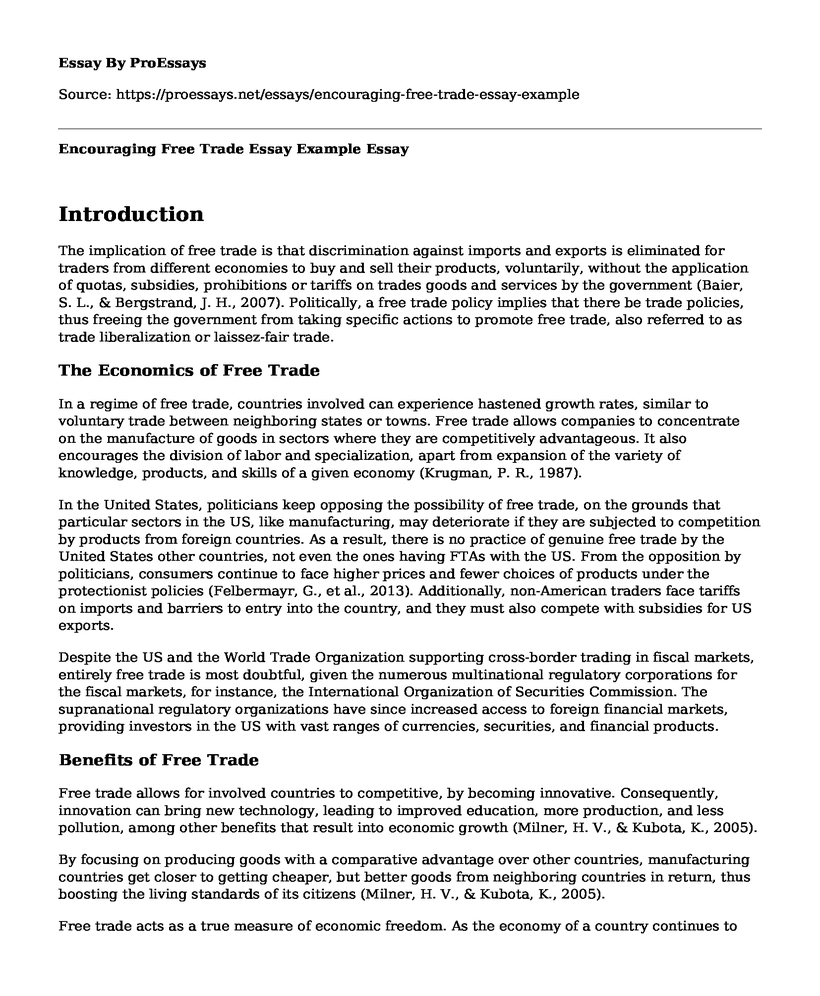Introduction
The implication of free trade is that discrimination against imports and exports is eliminated for traders from different economies to buy and sell their products, voluntarily, without the application of quotas, subsidies, prohibitions or tariffs on trades goods and services by the government (Baier, S. L., & Bergstrand, J. H., 2007). Politically, a free trade policy implies that there be trade policies, thus freeing the government from taking specific actions to promote free trade, also referred to as trade liberalization or laissez-fair trade.
The Economics of Free Trade
In a regime of free trade, countries involved can experience hastened growth rates, similar to voluntary trade between neighboring states or towns. Free trade allows companies to concentrate on the manufacture of goods in sectors where they are competitively advantageous. It also encourages the division of labor and specialization, apart from expansion of the variety of knowledge, products, and skills of a given economy (Krugman, P. R., 1987).
In the United States, politicians keep opposing the possibility of free trade, on the grounds that particular sectors in the US, like manufacturing, may deteriorate if they are subjected to competition by products from foreign countries. As a result, there is no practice of genuine free trade by the United States other countries, not even the ones having FTAs with the US. From the opposition by politicians, consumers continue to face higher prices and fewer choices of products under the protectionist policies (Felbermayr, G., et al., 2013). Additionally, non-American traders face tariffs on imports and barriers to entry into the country, and they must also compete with subsidies for US exports.
Despite the US and the World Trade Organization supporting cross-border trading in fiscal markets, entirely free trade is most doubtful, given the numerous multinational regulatory corporations for the fiscal markets, for instance, the International Organization of Securities Commission. The supranational regulatory organizations have since increased access to foreign financial markets, providing investors in the US with vast ranges of currencies, securities, and financial products.
Benefits of Free Trade
Free trade allows for involved countries to competitive, by becoming innovative. Consequently, innovation can bring new technology, leading to improved education, more production, and less pollution, among other benefits that result into economic growth (Milner, H. V., & Kubota, K., 2005).
By focusing on producing goods with a comparative advantage over other countries, manufacturing countries get closer to getting cheaper, but better goods from neighboring countries in return, thus boosting the living standards of its citizens (Milner, H. V., & Kubota, K., 2005).
Free trade acts as a true measure of economic freedom. As the economy of a country continues to grow, so does its demand for products for consumption. With free trade, more production of goods becomes inevitable, thus expanding businesses, creating more employment opportunities and growing the economy at the end (Milner, H. V., & Kubota, K., 2005).
Limitation of Free Trade
With free trade, countries will be obsessed with competition so much that the effect might be detrimental for everyone. Countries might end up cutting regulations and wage, among other things to gain a competitive advantage over other countries (Chang, H. J., 2010). The intense competition could end up hurting the economies of developed nations while benefiting developing countries, as the developing countries can reap easy benefits like cheap imports from developed countries striving to impress on foreign markets (Chang, H. J., 2010).
Conclusion
Free trade, therefore, should be encouraged to push involved countries into being innovative, produce better quality and higher quantity of goods and services, thus improving the economy and boosting the living standards of citizens. More countries should make policies that favor free trade.
References
Bergstrand, J. H., &Baier, S. L. (2007). Do free trade agreements actually increase members' international trade?. Journal of international Economics, 71(1), 72-95.
Krugman, P. R. (1987). Is free trade passe?. Journal of economic Perspectives, 1(2), 131-144.
G., Heid, B, Felbermayr., & Lehwald, S. (2013). Transatlantic trade and investment partnership (TTIP). Who benefits from a free trade deal? Part 1: Macroeconomic effects. Books.
Kubota, K., & Milner, H. V., (2005). Why the move to free trade? Democracy and trade policy in the developing countries. International organization, 59(1), 107-143.
Chang, H. J. (2010). Bad Samaritans: The myth of free trade and the secret history of capitalism. Bloomsbury Publishing USA.
Cite this page
Encouraging Free Trade Essay Example. (2022, Jul 06). Retrieved from https://proessays.net/essays/encouraging-free-trade-essay-example
If you are the original author of this essay and no longer wish to have it published on the ProEssays website, please click below to request its removal:
- International Trade and Economic Growth in Nigeria - Thesis Statement Example
- Trade and Protectionism Essay Example
- Essay Sample on US-China Trade War: Economic Turmoil & Impact on GDP
- Research Paper on China-US Trade War: Unfair Trading Activities & Tariff Barriers
- China's Export Boom: Manufacturing & Trade Hub - Essay Sample
- Retaining Competitive Edge: Amazon Case Study on E-Commerce Retail Mgmt.
- Essay Sample on Global Trade: A Vital Indicator of the International Economy







